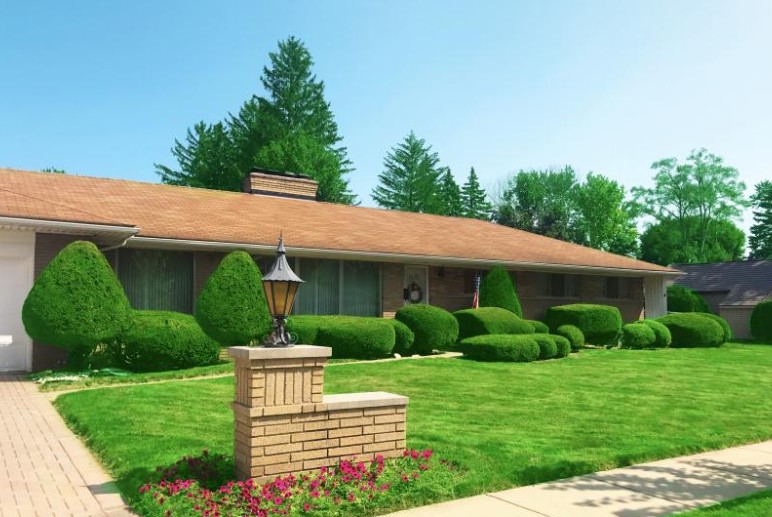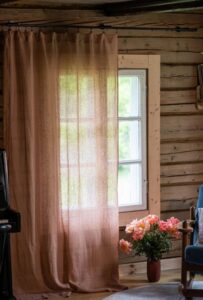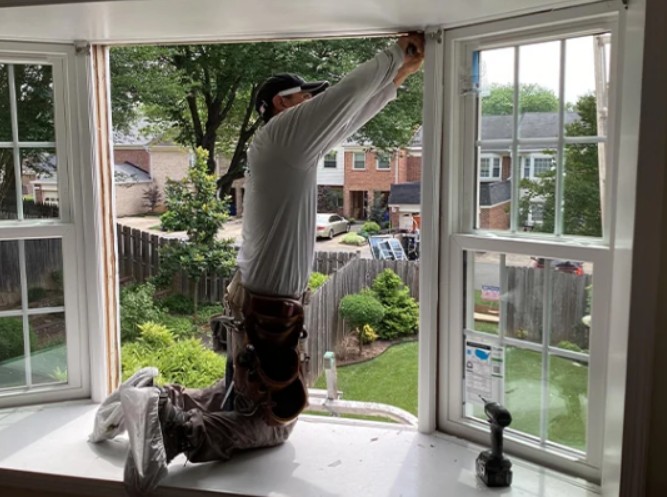NEW YORK
CNN
—
Emmanuelle Chiche remembers the first time she stumbled upon Elizabeth Street Garden, a charming green space hidden between rows of concrete buildings in lower Manhattan.
It wasn’t like any other garden in the city, she remembers thinking. It transported her back to France, her home country, with its dozens of beautifully aging neoclassical sculptures and columns.
“In this place, I learned that there is such a thing as falling in love with a garden,” Chiche, 55, said while standing on a stone balcony overlooking a blossoming pink rose bush. Below, a visitor stops to bring one of the flowers to her nose. Eyes shut, she inhales deeply and basks in its scent.
Since 2013, Chiche and others in the Little Italy neighborhood have been worried about city plans to replace the garden with yet another building. But on Tuesday, they celebrated a victory in the legal battle to protect it.
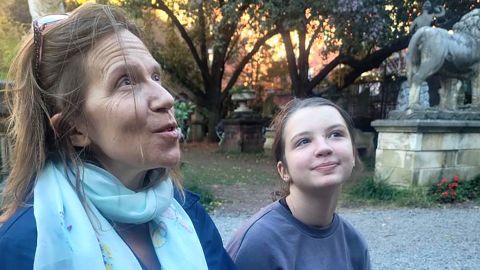
State Supreme Court Judge Debra James granted a 2019 petition by Elizabeth Street Garden Inc., the nonprofit organization that operates and maintains the garden, to block construction of an affordable housing complex in its place. James also ordered the City of New York, which owns the property, to conduct a full environmental impact statement before approval for the development can be granted.
“When I saw the notification I started shaking,” said Norman Siegel, the civil rights lawyer who represents the nonprofit. “The law in the case says they have to take a hard look at the environmental issues, and one of the biggest issues they have to look at is the loss of open space.”
Sitting on a bench in front of Central Park’s Upper West Side, Siegel offers a huge smile. “They won,” he said, adding it would be impossible for the city to defend the development plan without showing it would have a negative impact on the environment.
The New York City Department of Housing Preservation and Development (HPD) called the judge’s decision “disappointing” and said in a statement to CNN it will appeal – indicating plans for a protracted fight.
Haven Green, the project planned for the site, is a 123-unit affordable rental complex for senior citizens, according to the development’s website. It will also include a green space, retail stores and the new headquarters for Habitat for Humanity New York City.
HPD says Haven Green is necessary to address New York City’s growing problem with affordable housing, and was designed with the environment in mind.
“With 100,000 seniors currently waiting for access to affordable homes, we cannot allow a small number of anti-housing voices to continue standing in the way of projects our city so desperately needs,” HPD said in a statement to CNN.
Open New York, a grassroots group advocating for affordable housing, echoed HPD’s position. “Housing delayed is housing denied, and we simply can’t afford to let a small number of anti-housing voices block 100 percent affordable housing in a well-resourced neighborhood,” said executive director Annemarie Gray.
But Joseph Reiver, executive director of Elizabeth Street Garden Inc., says it’s not that simple.
His father, Allan Reiver, was the artist who decades ago transformed an empty, trash-filled lot into Elizabeth Street Garden. The elder Reiver, who ran an art gallery and filled the garden with his collection of sculptures and artifacts, died in 2021, leaving the garden in the hands of his son and thousands of volunteers who have been fighting for nearly a decade to protect it.
“It was my father’s legacy, but it’s not my garden,” Reiver said, sitting on a bench inside one of its many quiet nooks. “It belongs to this community, the community values it, and they would be devastated if they lost it.”
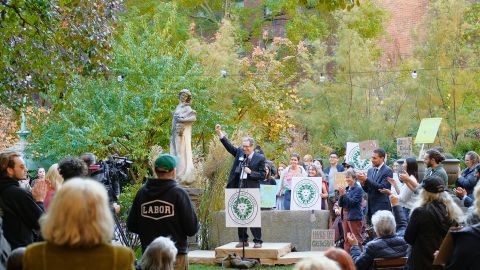
Reiver rejects claims by HPD and Open New York that Elizabeth Street Garden Inc. as a fringe group opposed to affordable housing.
“It’s a false choice, a divide and conquer tactic, to say, well, would you rather senior affordable housing or a lush community garden? You missed the issue. We are in dire need of both,” Reiver said. “We should heavily question any agency or leadership that says we can only have one or the other.”
Habitat for Humanity New York City CEO Karen Haycox contends Haven Green would provide both, as it has plans for 16,000 square feet of publicly accessible green space.
Siegel argues the green space the project promises “is not comparable to Elizabeth Street Garden” and will sacrifice necessary amenities the garden currently provides, including sufficient access to sunlight and space for large community activities.
District 1 Councilmember Christopher Marte, who represents the neighborhood where the garden grows, says the community has offered the city multiple proposals “to build senior affordable housing at other sites where we can get up to four times more units than at the Elizabeth Street Garden site.”
The city rejected those proposals, he said.
Supporters of Elizabeth Street Garden are confident an environmental impact statement will reveal construction of Haven Green would adversely impact the environment and quality of life in the neighborhood.
Christopher Kennedy, associate director at the Urban Systems Lab at The New School, says it’s a plausible conclusion.
“The more green space the better,” Kennedy, who authored a study about the positive impact of green spaces in cities, told CNN. “Green spaces offer endless climate related benefits, especially in relation to urban flooding issues. With extreme heat, which will become much more common in 50 years, the amount of vegetation coverage like trees and shrubs can cool the area substantially several degrees within an afternoon, which can be a life or death difference.
“When you take green spaces away, you increase the vulnerability of New Yorkers,” he added.
Razing the garden can also have “monumental” effects on the mental health of local residents, Kennedy said. Many rely on garden events and programs – including morning yoga, summer movie nights, poetry readings, and partnerships with local schools – for a sense of community.
“The garden is so unique because even though there are a lot of public parks and bigger parks, they can’t provide the same services the garden provides,” he said. “It isn’t just about getting outside for fresh air, it’s about the opportunity to connect with your neighbor and community and that translates to positive mental health impacts.”
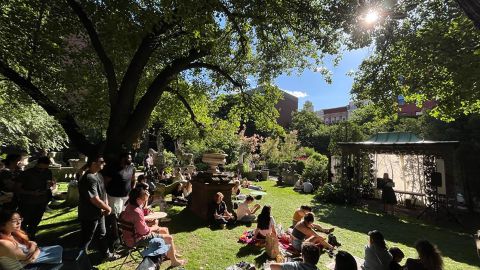
It could also affect local wildlife, supporters say. Elizabeth Street Garden, certified by the National Wildlife Foundation, is a registered way station for endangered monarch butterflies, providing them with nectar, milkweed and shelter.
The city has pointed to other parks that provide similar services, but it’s not the same said Councilmember Marte.
The neighborhood is “definitely underserved,” he said. “Our neighborhood shows that Elizabeth Street Garden is one of the only places to bring green to Little Italy, Chinatown, SoHo, and NoHo. Even though we love Washington Square Park, it’s not our neighborhood. It’s a completely different area, and most seniors can’t do that 20-minute walk to that park.”
Renée Green, a local senior and chairman of Elizabeth Street Garden Inc., says the garden has been vital to her health and wellness.
“From the time I moved here 15 years ago, I was riddled with arthritis,” said Green, 91. “The garden is everything to our community, and for people like myself, who are only growing older, losing it will mean losing our only access to nature, to a community, and that would be devastating.”
Nicholas O’Connell, 51, lives across the street from the garden. He says removing it would irrecoverably alter the community’s landscape.
“You walk around this neighborhood and there really isn’t trees, there’s no nature, and to destroy the garden and the ecosystem it has created would really be unacceptable,” he said. “We don’t want whatever they’re trying to bring, it will never match what we have here.”
Along with the distinctive sculptures from Allan Reiver’s collection, Elizabeth Street Garden boasts a gravel path bordered by stone ornamental railings designed by French landscape architect Jacques-Henri-Auguste Gréber during the Gilded Age.
Every corner of the sanctuary reveals another alcove, with benches hidden under canopies of colorful trees from which birds sing, providing respite from the noise of the bustling city. Those seeking sunshine have endless options to lie in between pear trees, beds of roses, dahlias, asters, dianthus, and geraniums.
“It’s like walking into the magical garden from a story book, it really is surreal,” said Geena DiGuilio, a garden volunteer.
On a balcony across from her a couple sits on a bench, hands intertwined, one reading a book aloud to the other. Later that afternoon, a newlywed bride and groom will laugh as they run down the path toward the garden’s entrance.
“My favorite thing is bringing my friends and watching their faces when they first walk in, that shocked ‘what is this place?’ And seeing them soak in the magic,” DiGuilio said.
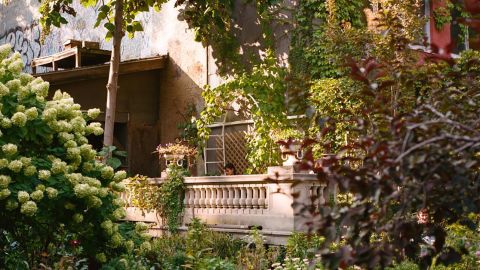
The Department of Housing Preservation and Development remains adamant Haven Green won’t harm the community, and says it’s committed to the project. “We stand by our environmental reviews, we are determined to bring Haven Green to this site, and we will pursue every avenue available to ensure that happens,” it said in its statement.
To counter those efforts, Reiver says the nonprofit will try to preserve Elizabeth Street Garden as a conservation land trust, so it can continue operating the garden and its community programs free of encroachment by the city.
In the meantime, Reiver is urging Mayor Eric Adams and other officials to visit the garden and see its impact for themselves. “Come see what’s at stake,” he said.
After last week’s legal victory, he and supporters believe anything is possible.
“So many people saw us as that little garden who will never win. But we won, at least for now, and we won’t give up ever,” Chiche said.


